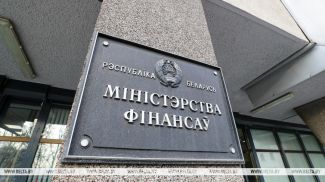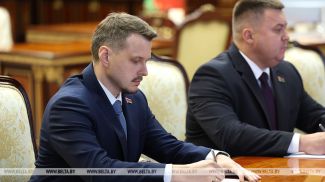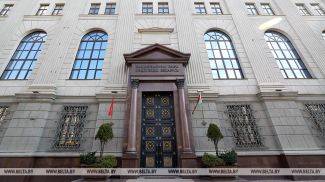MINSK, 6 November (BelTA) - International anti-cartel practices are in the spotlight of a seminar running in Minsk. The event has been organized by the Ministry of Antitrust Regulation and Trade (MART) of Belarus with assistance of the Organization for Economic Co-operation and Development (OECD), and the Office of Competition and Consumer Protection of the Republic of Poland, BelTA has learned.
“The seminar is the first practical step towards implementing a memorandum of cooperation between the Ministry of Antitrust Regulation and Trade of Belarus and the Office of Competition and Consumer Protection of the Republic of Poland, which was signed during a session of the Belarusian-Polish Commission on Economic Cooperation last November,” said Evgeny Belov, the head of the Department of International Cooperation and Non-Tariff Regulation at the MART. “The theme of the seminar has been chosen for a reason. It is one of the most complex in the field of trade and antitrust regulation. This is why we have invited leading international experts from the OECD and colleagues from Poland. The knowledge that MART employees will receive in the course of the seminar will allow us to apply the world's best practices in Belarus. In general this will improve the overall competitiveness of the Belarusian economy and help the country to be better represented in international rankings,” he added.
He added that the topic of cartels is as relevant for Belarus as it is for other states. Anti-cartel practices contribute to the fight against corruption, improve public procurement and the use of budget funds. They also reduce prices for goods and services, and improve their quality.
Cartels set prices (by inflating them 10% or more) or share spheres of influence, while remaining independent entities. Thus the market is beginning to acquire the features of a monopoly. The risk of cartels is higher in sectors where the level of economic concentration is already high. Most often, cartels operate in such commodities as cement, sugar, flour and other, mainly homogeneous goods. Other sectors can be susceptible to this problem too if authorities fail to take measures to counteract cartels. Losses can make up from 12% to 20% of GDP.
According to international experts, Belarus needs effective law enforcement practices. This year the OECD has analyzed the Belarusian legislation and found that it has been crafted well, senior competition expert at the OECD Sabine Zigelski said. “MART, however, does not have enough authority to carry out sudden inspections both at enterprises and homes of the owners of these enterprises,” Sabine Zigelski said. For now, unscheduled inspections by government agencies are not the best solution for Belarus. Commutation in the event of a plea bargain does not seem appropriate either, due to the lack of a proper law enforcement policy. Therefore, the seminar focuses on other methods of cartel detection: parallel pricing policies, direct and indirect indicators of collusion, and so on.
According to President of the Polish Office of Competition and Consumer Protection Marek Niechcial, one of the goals of the seminar is to deepen cooperation between Belarus and the OECD. “The country's authorities should draw up anti-cartel laws to improve the quality of products and keep prices as low as possible for consumers. Cartels inflate prices by taking advantage of their monopoly position. Cartels are against innovations. The OECD has special standards designed to expand the powers of bodies to carry out various inspections to determine whether activities are collusion. I hope that a law will be developed in Belarus soon expanding the powers of law enforcement agencies,” Marek Niechcial said.
Polish Ambassador to Belarus Artur Michalski emphasized that international experience is pivotal in such work. “We are very grateful for the experience and assistance we received from other countries in the past. We can see that Belarusian partners are ready to cooperate, so they will be provided assistance,” he added.













